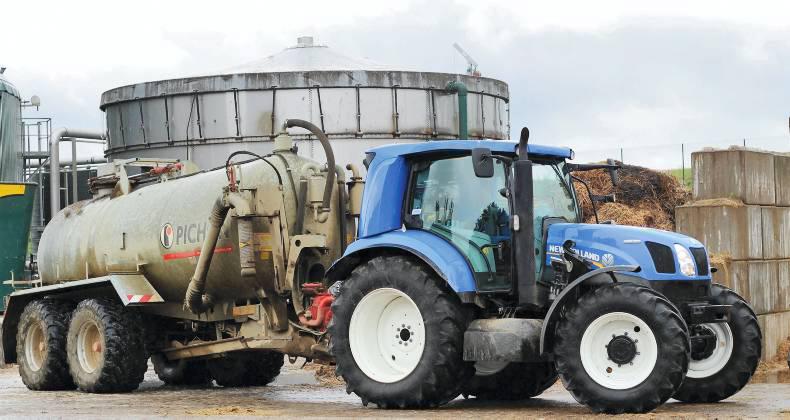A new prototype tractor that runs on bio-methane produced by farm waste from 1,000 dairy cows was tested by British farmers last week.
New Holland says the tractor has the potential to reduce polluting emissions by 80% and offer farmers significant savings in fuel costs. Wyke Farms, one of the UK’s biggest cheddar producers, and Worthy Farm, both tested the tractor.
New Holland has developed the new tractor, which can run entirely on bio-methane derived from waste and produced by on-farm biogas (anaerobic digester) plants.
Wyke Farms in Bruton, Somerset, has been producing cheddar cheese and other dairy products for over 150 years and is passionate about its 100% green initiative, which has recently earned it some awards.
The farm’s biogas plant plays a big part in meeting its sustainability objectives, with three large anaerobic digesters producing electricity for the farm and factory. The resulting gas is cleaned up and used to power the farm’s boilers, with excess sold back to the grid to serve the local community.
Using compressed natural gas
The digesters are fed entirely from waste, including slurry from the farm’s 1,000 dairy cows, local cider apple waste and other waste not fit for human or animal consumption. The farm runs three electric cars and in the future could run its tankers on compressed natural gas (CNG) produced by the biogas plant. Having a compression plant on-site would also give Wyke Farms the opportunity to invest in tractors powered by methane – giving them complete energy independence on farm.
New Holland’s methane tractor borrows from commercial vehicle technology already used by its sister brand, Iveco. The use of compressed natural gas in vans, trucks and buses is well developed and limited only by storage capacity on the vehicle. The company has managed to squeeze 300l (52kg) of compressed methane into nine tanks around the tractor; enough for around six hours of work depending on the type of activity.
Fuel-efficient vehicles
Refuelling is quick, taking around the same time to fill as with diesel. Roger Clothier, Wyke Farms’ director, who is testing the prototype tractor, said: “On first impression it looks and feels just like a normal tractor when you jump in the cab. It easily managed to tow a full slurry tanker up and down the hills here – with a combined tractor and tanker weight of 27t.
“We need fuel-efficient vehicles with a good power-to-weight ratio to pull heavy tanks around the farm – the tractor has the power to do it and, if we’re able to compress our gas on-site, it looks like it could save us money.
Adapting existing engine technology, fitting a small three-way catalytic converter and housing it within a standard tractor chassis and cab means the methane tractor looks and drives just like a diesel-powered tractor, and the cost of buying one should be about the same.
Read more
Watch: The 2,000-mile American harvest
John Deere expands Gator range for 2016
A new prototype tractor that runs on bio-methane produced by farm waste from 1,000 dairy cows was tested by British farmers last week.
New Holland says the tractor has the potential to reduce polluting emissions by 80% and offer farmers significant savings in fuel costs. Wyke Farms, one of the UK’s biggest cheddar producers, and Worthy Farm, both tested the tractor.
New Holland has developed the new tractor, which can run entirely on bio-methane derived from waste and produced by on-farm biogas (anaerobic digester) plants.
Wyke Farms in Bruton, Somerset, has been producing cheddar cheese and other dairy products for over 150 years and is passionate about its 100% green initiative, which has recently earned it some awards.
The farm’s biogas plant plays a big part in meeting its sustainability objectives, with three large anaerobic digesters producing electricity for the farm and factory. The resulting gas is cleaned up and used to power the farm’s boilers, with excess sold back to the grid to serve the local community.
Using compressed natural gas
The digesters are fed entirely from waste, including slurry from the farm’s 1,000 dairy cows, local cider apple waste and other waste not fit for human or animal consumption. The farm runs three electric cars and in the future could run its tankers on compressed natural gas (CNG) produced by the biogas plant. Having a compression plant on-site would also give Wyke Farms the opportunity to invest in tractors powered by methane – giving them complete energy independence on farm.
New Holland’s methane tractor borrows from commercial vehicle technology already used by its sister brand, Iveco. The use of compressed natural gas in vans, trucks and buses is well developed and limited only by storage capacity on the vehicle. The company has managed to squeeze 300l (52kg) of compressed methane into nine tanks around the tractor; enough for around six hours of work depending on the type of activity.
Fuel-efficient vehicles
Refuelling is quick, taking around the same time to fill as with diesel. Roger Clothier, Wyke Farms’ director, who is testing the prototype tractor, said: “On first impression it looks and feels just like a normal tractor when you jump in the cab. It easily managed to tow a full slurry tanker up and down the hills here – with a combined tractor and tanker weight of 27t.
“We need fuel-efficient vehicles with a good power-to-weight ratio to pull heavy tanks around the farm – the tractor has the power to do it and, if we’re able to compress our gas on-site, it looks like it could save us money.
Adapting existing engine technology, fitting a small three-way catalytic converter and housing it within a standard tractor chassis and cab means the methane tractor looks and drives just like a diesel-powered tractor, and the cost of buying one should be about the same.
Read more
Watch: The 2,000-mile American harvest
John Deere expands Gator range for 2016






 This is a subscriber-only article
This is a subscriber-only article





SHARING OPTIONS: